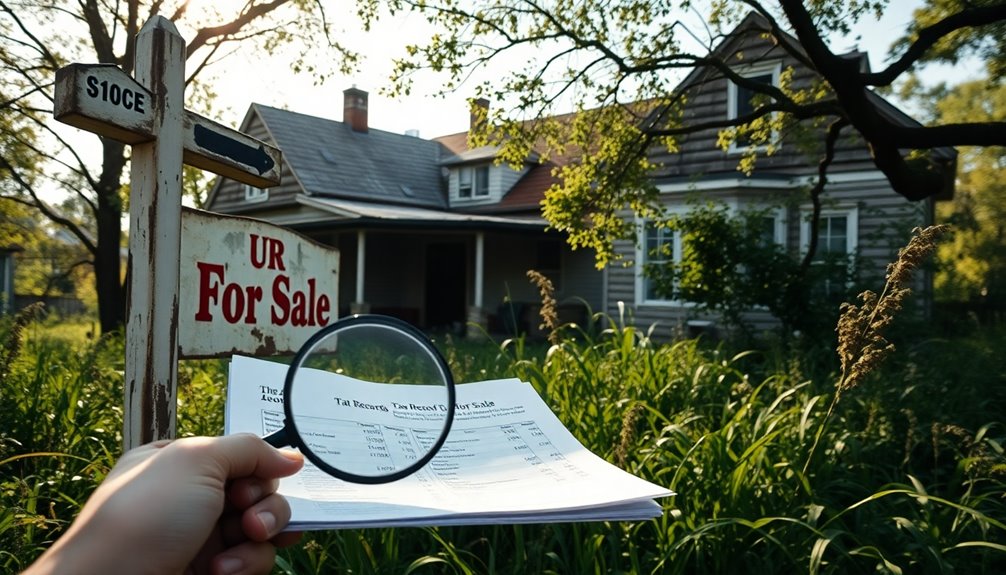To buy property with delinquent taxes, start by understanding tax lien sales, where you can bid on delinquent taxes owed. Research properties by checking local government listings and assessing market value. Before the auction, prepare by knowing the auction type and setting a maximum bid limit. During the auction, manage your emotions and be ready to walk away if necessary. Once you acquire the tax lien, you'll have rights to interest but not immediate ownership. If you want to fully grasp the complexities and potential pitfalls, there's much more to uncover about this investment strategy.
Key Takeaways
- Research delinquent properties through local government websites and county tax collector offices for available tax lien sales.
- Conduct thorough due diligence, including property condition assessments, title searches, and understanding existing liens and regulations.
- Familiarize yourself with the auction process, types of sales, and specific rules governing bidding and payments.
- Set a clear budget for bidding, including additional costs for repairs and legal fees, and stick to it during the auction.
- Understand the redemption process and potential risks involved, including the possibility of foreclosure if the property owner fails to pay.
Understanding Tax Lien Sales

When it comes to buying property with delinquent taxes, understanding tax lien sales is crucial. These public auctions allow local governments to sell the right to enforce a tax lien to the highest bidder. Typically, your minimum bid includes the amount of taxes owed, plus any interest, fees, and costs associated with the lien.
By purchasing a tax lien, you gain the authority to collect the tax debt, and you can earn interest on the lien, which usually ranges from 10% to 12%, depending on your state. However, it's important to note that tax liens hold first-priority status over other debts, such as mortgages, which can complicate ownership claims.
Be aware that you'll pay a premium over the tax lien amount for a tax lien certificate. The total cost will incorporate taxes, delinquent interest, advertising, and various fees. While you can recoup these costs through payments made by the property owner, the risks involved are significant.
The property's value might be less than the lien amount, and other liens could impede your ownership. A tax lien doesn't convey ownership immediately; it only entitles you to the lien amount plus interest.
If the owner fails to pay, you may eventually have the right to foreclose on the lien to take ownership of the property.
Researching Properties for Purchase

After gaining a solid understanding of tax lien sales, the next step involves researching properties that have delinquent taxes. Start by checking with your county treasurer or tax collector's office for lists of properties with unpaid taxes. You can also review local government websites for advertised tax lien sales and delinquent property lists. Additionally, contact the county assessor's office to gather property tax delinquency data.
Once you've identified potential properties, assess their market value and compare it to the amount of the delinquent tax lien. Calculate your risk by dividing the lien amount by the property's market value. Be sure to check for other liens that might complicate ownership and evaluate the property's condition for any needed repairs. Understanding tax implications is vital, as it can affect your investment strategy and potential returns.
Understand local regulations, including the public sale process for delinquent taxes and the redemption period for owners to repay owed amounts. Conduct thorough due diligence by reviewing the property's history and verifying ownership details.
Lastly, consult with real estate agents or financial advisers to get valuable insights before making any purchase decisions. This meticulous research will set you up for a successful investment in delinquent properties.
Preparing for the Auction
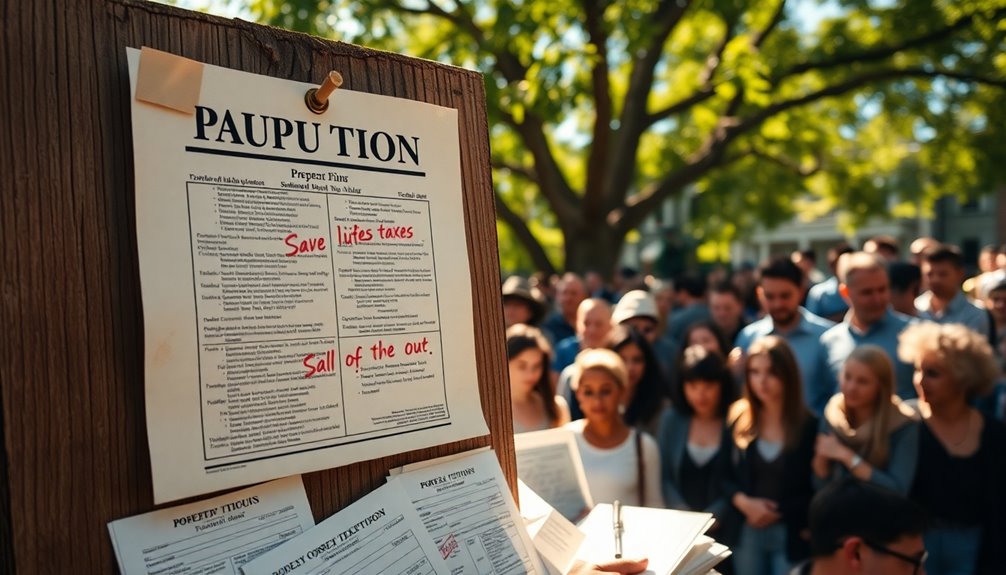
Preparing for the auction requires a clear understanding of the process and diligent research. You'll want to familiarize yourself with the type of auction—whether it's an upset sale, judicial sale, or bid-off sale—as each has different procedures.
Keep an eye out for public notices in local newspapers and online, as they'll provide crucial details about the auction date and properties available.
Before the auction day, verify any unpaid taxes and fees linked to the property by visiting the county courthouse. It's also essential to assess the property's condition, as this can affect its investment potential. Understanding the lien process is crucial for success in bidding.
Consulting tax lien experts can ensure you have all necessary paperwork in order and give you valuable insights.
Financially, determine the minimum bid, which typically includes unpaid taxes, interest, and fees. Make sure you have enough funds to cover the bid and additional costs, like transfer fees and deed preparation.
Remember, full payment is often required on the auction day, so be prepared to act quickly.
Lastly, understanding the local market can help you gauge the property's true value and investment potential.
Bidding Strategies to Consider

Successful bidding requires a strategic approach that incorporates thorough research and financial planning. Start by conducting extensive due diligence on the property. This includes title searches, property inspections, and evaluating surrounding areas, even if you can't inspect the site directly. Familiarize yourself with local tax laws and auction processes to avoid unexpected liabilities. Understanding local laws helps mitigate risks associated with non-compliance.
Next, develop a clear auction strategy. Know when to bid and set maximum bid limits to keep your budget in check. Utilize various bidding techniques, like starting with a price close to your maximum to deter low bids or using high bids to intimidate competitors. Pay attention to other bidders' body language; it can reveal their limits.
Financial planning is crucial. Ensure you have funds available not just for the bid, but also for potential repairs and legal fees. Set a strict budget based on the property's value and necessary costs, including any accumulated taxes or penalties.
Lastly, manage your emotions. Stay focused on your goal, and don't let excitement lead to overbidding. If the bidding exceeds your budget, be ready to walk away. Keeping a cool head can save you from financial strain in the long run.
Rights of the Lienholder
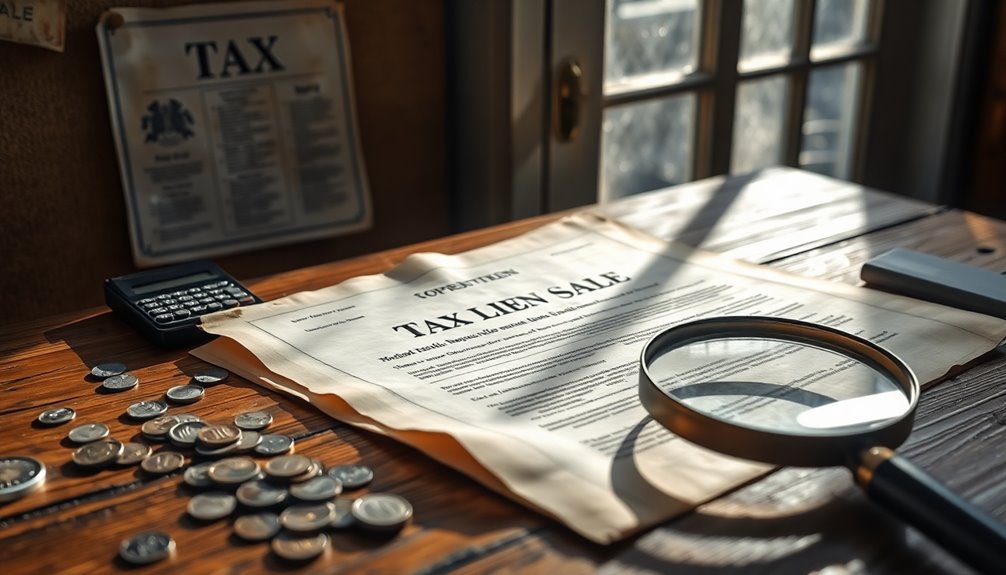
As a lienholder, you hold significant rights and powers when it comes to collecting delinquent taxes. Once you obtain a tax lien certificate, you gain ownership of the lien for that tax year and its face amount. This certificate entitles you to statutory interest and costs, which can vary by county—like the 10% in Nassau County. You can collect the original tax amount, plus accrued interest and any additional fees.
If the property owner doesn't pay within a specified timeframe, you can initiate tax lien foreclosure proceedings. This legal action allows you to secure the property through a court-ordered auction if the owner fails to redeem the lien. Bankruptcy protection can provide an additional layer of complexity, as property owners may seek relief from their debts during this process.
While you have these rights, be aware of the limitations: property owners can contest assessments or set up installment agreements early in the process. Additionally, any other liens on the property must be resolved before a sale can proceed.
Public notice is also a requirement before a tax lien sale, ensuring transparency throughout the process. Understanding these rights and limitations can help you navigate the complexities of tax lien investments effectively.
Navigating the Redemption Process
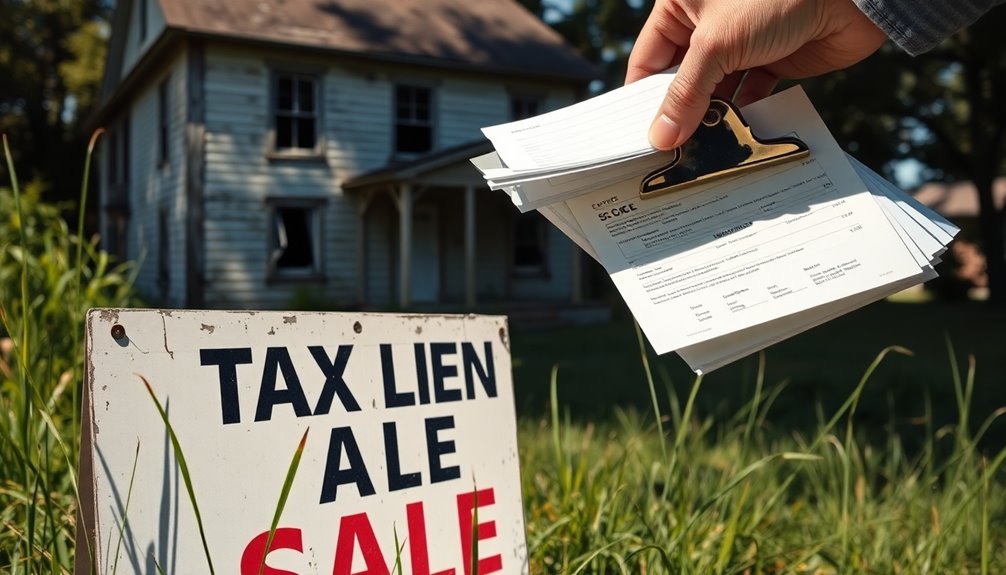
Navigating the redemption process can be crucial for property owners facing delinquent taxes, as it provides a chance to reclaim their property before losing ownership. The redemption period varies by state, with New York typically allowing two years after the lien date, while Illinois offers a minimum of 2½ years for residential properties. It's essential to know your state's regulations.
To redeem your property, you must pay the delinquent tax amount, including any interest, penalties, and additional charges such as publication costs. Payments need to go to the enforcing officer or an authorized official. Additionally, it's important to note that the redemption process is governed by the New York Real Property Tax Law, which establishes the specific procedures for compliance.
Remember, failure to pay the full amount during the redemption period means you risk losing ownership.
Upon successful redemption, the enforcing officer issues a certificate of redemption, filed with the county clerk. This action updates the delinquent tax records, indicating your property is no longer at risk.
Acting promptly is vital to avoid extra costs and complications. If you miss the redemption window, the tax buyer can obtain a tax deed, transferring ownership to them, leaving you with limited legal options.
Stay informed and proactive to protect your investment!
Foreclosure and Title Acquisition
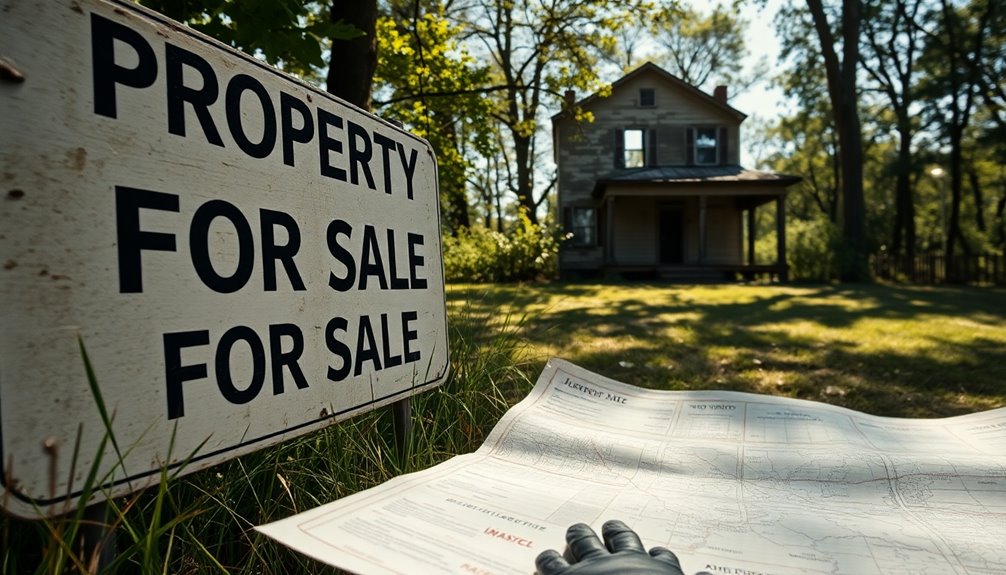
When faced with delinquent taxes, understanding the foreclosure process and title acquisition is essential for both property owners and potential buyers. Initially, a statutory lien is placed against the property due to unpaid taxes. If the redemption period expires, the lien holder can begin judicial foreclosure proceedings. This leads to a court order for a foreclosure auction, where the property is sold to the highest bidder. If the property owner doesn't respond to the lawsuit, a default judgment is entered against them.
During tax lien foreclosure, the lien holder typically acquires the property, and superior tax liens eliminate other liens, including mortgages. The county then clears any remaining liens according to the tax sale closing documents. The judgment and title transfer are recorded publicly, impacting the previous owner's credit score. Additionally, tax lien certificates are sold at public auctions, allowing investors to potentially earn interest on their investment while helping to resolve unpaid tax obligations.
In a tax deed sale, the property is auctioned off to recover unpaid taxes, with the minimum bid covering back taxes plus costs. The winning bidder often gains immediate ownership without a redemption period, receiving a clear title free from other liens.
Understanding these processes prepares you for a successful acquisition of property with delinquent taxes.
Potential Risks and Considerations
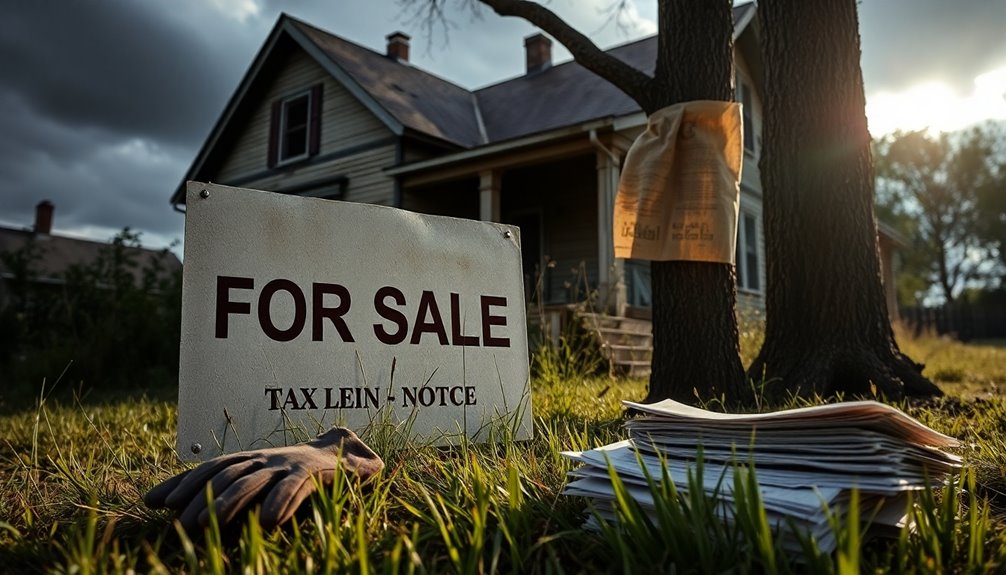
Acquiring property with delinquent taxes can be a tempting prospect, but it's crucial to weigh the potential risks and considerations before diving in.
First, consider the property's condition. You might find yourself facing unexpected repair costs, from structural issues to environmental hazards like out-of-code septic systems. Local fines for maintenance problems can also exceed the property's value, leaving you with a financial burden. Additionally, purchasing a tax lien certificate does not guarantee ownership of the property, which can complicate your investment strategy.
Next, be aware of additional liens and debts. Properties may have other delinquent tax liens or mortgage liens that you'll need to pay off. Unidentified liens can lead to significant losses, especially if the previous owner filed for bankruptcy.
Legal and regulatory risks are another factor. Local laws vary, and you'll need to research property titles and ownership disputes thoroughly. Understanding redemption periods is essential to manage your expectations.
Lastly, keep an eye on market conditions. High competition can drive up prices at tax sales, reducing your potential returns. If the property turns out to be worthless or has significant issues, the investment could be far less profitable than anticipated.
Always approach this venture with caution and due diligence.
Frequently Asked Questions
What Is the Typical Timeline for the Tax Lien Process?
The typical timeline for the tax lien process starts with a Notice of Delinquency sent in February, followed by a Notice of Impending Lien 30 days before the lien date.
If you miss the payment deadline, a lien gets placed, and interest rises to 14% per annum.
You'll have two years to redeem the lien, after which the municipality may begin the deeding process.
Notices are sent 30 days prior to deeding.
Can I Buy Multiple Tax Liens at Once?
Yes, you can buy multiple tax liens at once. During tax lien auctions, you can bid on various properties, allowing you to secure several liens in a single event.
Just be prepared for the financial commitment, as you'll need upfront capital to cover the costs.
Remember, each auction has its own rules, so make sure you understand the specific procedures in your municipality before participating.
Good luck with your investments!
How Do I Find Upcoming Tax Lien Auctions?
To find upcoming tax lien auctions, start by checking your county or township's official website for auction dates and property lists.
Don't forget to look at local newspapers and community bulletin boards for additional notices.
You can also contact your local tax collector's office directly for details.
If you prefer online options, explore dedicated auction platforms where you can register and access valuable information about available properties.
Are There Any Hidden Fees in Tax Lien Purchases?
When you're considering tax lien purchases, you've gotta be aware of hidden fees.
These can include auction fees, legal costs, and title search fees that quickly add up.
Don't forget about potential property maintenance expenses, especially if repairs are needed.
Other liens tied to the property can also lead to unexpected costs.
Always budget for these hidden fees to avoid surprises and ensure your investment remains profitable.
What Happens if the Property Owner Files for Bankruptcy?
If you file for bankruptcy, an automatic stay halts collection activities, giving you temporary relief from foreclosure and other actions for delinquent property taxes.
However, tax liens remain in place, and property taxes assessed within a year before filing won't be discharged in Chapter 7.
In Chapter 13, you can create a repayment plan for unpaid taxes, but you'll still need to address those debts long-term to avoid issues later.
Conclusion
Buying property with delinquent taxes can be a rewarding investment if you approach it wisely. By understanding tax lien sales, researching properties, and preparing for auctions, you can position yourself for success. Remember to consider your bidding strategies and the rights of lienholders. Stay informed about the redemption process and potential foreclosures. While there are risks involved, the rewards can outweigh them if you're diligent. So, go ahead and explore this unique opportunity to expand your real estate portfolio!
